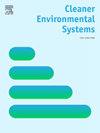Attributional life cycle assessment of recycling and disposal strategies for construction and demolition waste
IF 4.9
Q2 ENGINEERING, ENVIRONMENTAL
引用次数: 0
Abstract
The management of Construction and Demolition Waste (CDW) poses significant environmental challenges in Saudi Arabia, exacerbated by rapid urbanization and the Giga Projects under Vision 2030. This study presents a Life Cycle Assessment (LCA) of CDW management practices across seventeen municipalities, providing the first region-specific evaluation of environmental impacts using comprehensive data. By integrating primary and secondary data from local sources, Ecoinvent 3.91, and GaBi Sphera, the study evaluates key CDW disposal methods: sanitary landfilling, incineration, and recycling. The findings reveal that advanced recycling infrastructure (e.g., compactor trucks, recycling facilities) significantly reduces non-renewable energy use, Global Warming Potential (GWP), and downstream emissions, particularly in high CDW-generating regions like Riyadh and Jeddah. Notably, recycling achieves a GWP reduction of up to 75 million kg CO2-eq annually for key materials like mixed soil and concrete. Furthermore, the study contributes to global CDW management literature by presenting a replicable LCA framework that can be applied to other rapidly urbanizing economies facing similar waste management challenges. This framework offers valuable insights for policymakers, urban planners, and researchers seeking to develop sustainable CDW management strategies aligned with circular economy principles and international sustainability goals.
建筑和拆卸废物回收和处置策略的归因生命周期评估
在沙特阿拉伯,建筑和拆除垃圾(CDW)的管理构成了重大的环境挑战,而快速城市化和2030年愿景下的千兆项目加剧了这一挑战。本研究对17个城市的CDW管理实践进行了生命周期评估(LCA),首次使用综合数据对特定区域的环境影响进行了评估。通过整合来自当地来源、Ecoinvent 3.91和GaBi Sphera的第一手和二手数据,该研究评估了主要的CDW处理方法:卫生填埋、焚烧和回收。研究结果显示,先进的回收基础设施(如压实卡车、回收设施)显著减少了不可再生能源的使用、全球变暖潜能值(GWP)和下游排放,特别是在利雅得和吉达等cdw高发地区。值得注意的是,对于混合土和混凝土等关键材料,回收利用每年可减少高达7500万公斤二氧化碳当量的全球变暖潜能值。此外,该研究提出了一个可复制的LCA框架,可应用于其他面临类似废物管理挑战的快速城市化经济体,从而为全球CDW管理文献做出了贡献。该框架为政策制定者、城市规划者和研究人员寻求制定符合循环经济原则和国际可持续发展目标的可持续CDW管理战略提供了有价值的见解。
本文章由计算机程序翻译,如有差异,请以英文原文为准。
求助全文
约1分钟内获得全文
求助全文
来源期刊

Cleaner Environmental Systems
Environmental Science-Environmental Science (miscellaneous)
CiteScore
7.80
自引率
0.00%
发文量
32
审稿时长
52 days
 求助内容:
求助内容: 应助结果提醒方式:
应助结果提醒方式:


